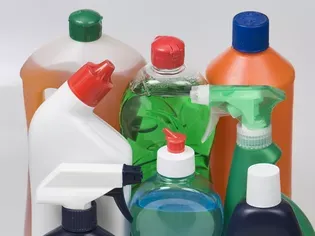Toxic Chemicals & Household Items That Can Poison Dogs
Updated on 04/26/24

Toxic Chemicals & Household Items That Can Poison Dogs: A Comprehensive Guide for Pet Owners
As a loving dog owner, you've likely taken countless precautions to ensure your furry friend's safety and well-being. However, there may be hidden dangers lurking within your own home that you might not be aware of. Certain household items and chemicals can pose serious health hazards to dogs, causing a wide range of illnesses, from mild discomfort to life-threatening conditions.
To keep your canine companion out of harm's way, it's essential to educate yourself about these potential toxins. In this comprehensive guide, we'll explore the most common toxic chemicals and household items that can poison dogs, providing specific examples and practical tips to prevent accidental ingestion or exposure.
Household Chemical Toxins
1. Fabric Softeners and Detergents
The chemicals used in fabric softeners and detergents can be highly irritating to dogs' sensitive skin and digestive systems. Ingestion can lead to symptoms such as vomiting, diarrhea, abdominal pain, and excessive thirst. In severe cases, it can cause chemical burns to the mouth, esophagus, and stomach.
2. Bleach and Ammonia
Bleach and ammonia are powerful cleaning agents that can release toxic fumes when mixed. These fumes can irritate the eyes, nose, and lungs of dogs, causing coughing, difficulty breathing, and chemical burns to the respiratory tract.
3. Insecticides and Pesticides
Insecticides and pesticides are used to kill pests, but they can also be fatal to dogs if ingested. These chemicals can cause a variety of symptoms, including tremors, seizures, muscle weakness, and respiratory failure.
Household Items
1. Plants
Many common houseplants are toxic to dogs. Some of the most dangerous include lilies, oleander, azaleas, rhododendrons, and daffodils. Ingestion of these plants can cause vomiting, diarrhea, lethargy, and even liver failure in severe cases.
2. Chocolate
Chocolate contains theobromine, a substance that is toxic to dogs. The darker the chocolate, the higher the concentration of theobromine, and the more dangerous it is for your pet. Ingestion of chocolate can lead to vomiting, diarrhea, hyperactivity, tremors, and heart problems.
3. Xylitol
Xylitol is a sugar substitute commonly found in sugar-free gum, candy, and baked goods. While it is safe for humans, it is highly toxic to dogs. Ingestion of xylitol can cause a sudden drop in blood sugar, liver failure, and even death.
Preventing Accidental Poisoning
1. Secure Household Chemicals
Keep all household chemicals in a locked cabinet or out of reach of your dog. Always read and follow the manufacturer's instructions carefully before using any chemical product.
2. Supervise Your Dog When Outside
When your dog is outside, supervise them closely to prevent them from ingesting plants or other hazardous materials. If you're not able to supervise your dog, keep them leashed or in a fenced area.
3. Choose Pet-Friendly Plants
If you have plants in your home, choose pet-friendly varieties. Keep all plants out of reach of your dog, and contact your veterinarian immediately if you suspect they have ingested a toxic substance.
4. Read Food Labels Carefully
Before giving your dog any human food, be sure to read the ingredient list carefully. Avoid giving your dog foods that contain chocolate, xylitol, or other harmful ingredients.
5. Keep Your Dog Vaccinated
Some diseases, such as parvovirus and distemper, can make dogs more susceptible to poisoning. Keep your dog up-to-date on all vaccinations to reduce their risk.
Signs of Poisoning
If you suspect your dog has ingested a toxic substance, seek veterinary attention immediately. The following are some common signs of poisoning in dogs:
* Vomiting
* Diarrhea
* Excessive thirst
* Lethargy
* Drooling
* Dilated pupils
* Tremors
* Seizures
Conclusion
Protecting your dog from poisoning is an essential part of responsible pet ownership. By being aware of the common toxins found in households, taking precautions to prevent accidental ingestion, and recognizing the signs of poisoning, you can help keep your furry friend healthy and safe for a long and happy life.
Explore More Pets

Basic Training
Puppy and Baby Introductions

Working Dog Breeds
All About Search and Rescue Dogs

Dog Treatments
Puppy Vaginitis: Signs, Causes and Treatment

Dog Adoption
After More Than 1,200 Days in the Shelter, Coco Goes Home

Basic Training
How to Train Your Puppy to Go on Potty Pads

Hybrid Dog Breeds
The Difference Between a Mutt, Mixed Breed, or Designer Dog?

Dog Treatments
Nail Problems in Dogs

Puppies
7 Reasons Why Two Dogs Are Better Than One